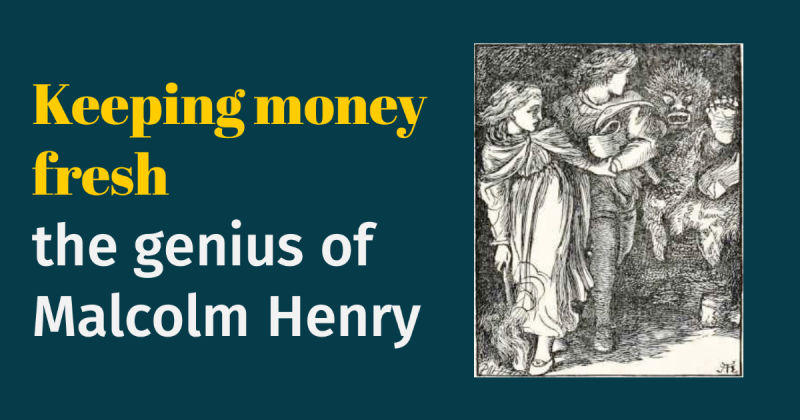14th March 2014 | By Simon Duffy
We need to rethink the role of money and distinguish its healthy purpose and the conditions which make it toxic.

Nothing that could be got from the heart of the earth could have been put to better purposes than the silver the king's miners got for him. There were people in the country who, when it came into their hands, degraded it by locking it up in a chest, and then it grew diseased and was called mammon, and bred all sorts of quarrels; but when first it left the king's hands it never made any but friends, and the air of the world kept it clean.
From the Princess and the Goblin by George MacDonald
I've just watched a brilliant film by Malcolm Henry on the creation of money and the case it creates for a basic (or citizen's) income.
I won't summarise the argument he makes, other than to say that - like MacDonald - he distinguishes two kinds of money (a) the money in circulation in the productive economy which the air of the world keeps clean and (b) the money in savings or gambling which has become diseased. Henry then argues that we are locked into a toxic relationship with the latter; while a system of taxation for savings plus citizen's income restores a healthy pattern of productive recirculation.
I do not know exactly whether this is the perfect solution to our problems; but it sounds compelling and intriguing to me. I will think more on this - and buy his book.
But it does strike me that in order to shift our thinking about social justice and to achieve a saner and fairer world we will need a new kind of economics. Henry seems to be doing exactly the right thing - offering us a way of picturing our situation which is true to our real challenges:
We are wealthy, but income is distributed unfairly; we are productive, but locked in debt.
It is worth remembering that the welfare state was partly the child of Beveridge - who designed some of its basic institutions - but it was also partly the child of Keynes - whose economic theory provided government with the confidence to act as the agent of growth. Today, while Beveridge and Keynes both have much to teach us, we are also suffering from the some of the limitations implicit in their models. In particular the Keynes-Beveridge welfare state tried to offer security of income through security of employment - but this model looks out-dated today.
Security is necessary, but the security we need must come from each other and not be linked to working as an 'employee'. Eventually we will find that freedom and security can be reconciled in a new economic framework.
So a big thank you to Malcolm Henry - a great innovator in the new economics we need!